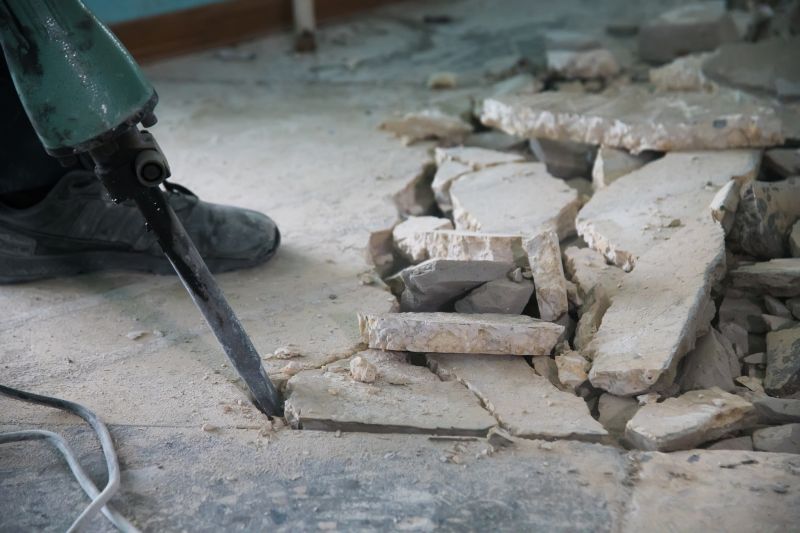Leading Supplies For Concrete Demolition Service Professionals
Explore high-performance tools designed to improve productivity and safety during concrete removal and demolition tasks.
 Concrete demolition is a critical step in various construction, renovation, and repair projects. Selecting the appropriate tools and equipment ensures the process is efficient, safe, and effective. Depending on the scope and scale of the demolition, different products can be employed, ranging from handheld tools to heavy machinery. Properly choosing the right equipment can help minimize labor time and reduce potential damage to surrounding structures.
Concrete demolition is a critical step in various construction, renovation, and repair projects. Selecting the appropriate tools and equipment ensures the process is efficient, safe, and effective. Depending on the scope and scale of the demolition, different products can be employed, ranging from handheld tools to heavy machinery. Properly choosing the right equipment can help minimize labor time and reduce potential damage to surrounding structures.
Top Overall Option
Electric Demolition Jackhammer
An electric demolition jackhammer offers a balance of power and portability, making it suitable for various concrete removal tasks. Its design allows for precise control and reduced noise compared to pneumatic options, while still providing effective breaking capabilities. Ideal for both professional contractors and serious DIY enthusiasts, this versatile tool can handle a range of project sizes with ease.
Types of Products For Concrete Demolition Service
Pneumatic Jackhammers
Powered by compressed air, these tools are commonly used for heavy-duty demolition work, offering high impact force and durability.
Hydraulic Breakers
Hydraulic-powered tools designed for large-scale demolition, capable of breaking through thick concrete and reinforced structures.
Electric Demolition Hammers
Corded or cordless electric tools that provide a good mix of portability and power for various demolition tasks.
Rotary Hammer Drills
Versatile tools that can drill and chisel into concrete, useful for smaller demolition or modification projects.
Concrete Saws
Equipment like cut-off saws and wall saws used to make precise cuts in concrete surfaces before removal.
Demolition Robots
Remote-controlled machines equipped with various attachments for precise and efficient demolition of large concrete structures.
Hydraulic Spreaders
Tools that use hydraulic pressure to split or break concrete, especially useful in confined spaces.
Breakers Attachments for Skid Steers
Heavy-duty attachments that convert skid steer loaders into powerful demolition tools for large-scale projects.
Chipping Hammers
Lightweight tools ideal for detailed chipping and removal of concrete debris in smaller areas.
Hammer Drills with Chiseling Function
Multi-purpose drills capable of drilling and chipping, suitable for light demolition tasks.
Diamond Blades
Specialized blades used with saws to cut through concrete, reinforced with diamond particles for durability.
Concrete Pulverizers
Attachments designed for crushing concrete into smaller fragments, facilitating debris removal.
Handheld Chisels and Picks
Manual tools for small-scale or detailed demolition work, useful for delicate or confined spaces.
Vacuum Systems for Dust Collection
Equipment to minimize dust during demolition, improving safety and cleanliness on site.
Popular Choices
Widely used for their portability and ease of use, suitable for various demolition projects.
Known for their high impact force, these tools are favored for heavy-duty concrete removal.
Versatile attachments that can be mounted on excavators for efficient large-scale demolition.
Popular for making precise cuts in concrete slabs and walls before removal.
Commonly used in construction sites for their power and maneuverability in confined spaces.
A versatile tool appreciated for its ability to drill and chisel in concrete surfaces.
Devices that help control dust during demolition, improving site safety.
Essential tools for small or detailed demolition work, especially in tight spaces.
Attachments used for breaking down concrete into manageable pieces for removal.
Power sources that enable hydraulic tools to operate efficiently on-site.
Lightweight and effective for surface chipping and small-scale demolition tasks.
Heavy-duty tools for cutting through concrete and reinforced materials during demolition.
For smaller-scale projects or precise removal tasks, handheld power tools such as jackhammers and rotary hammers are commonly used. These tools offer portability and control, making them suitable for breaking up concrete in tight spaces or areas requiring detailed work. Larger projects often necessitate the use of heavier machinery like hydraulic breakers, demolition robots, or skid steer attachments, which can handle more substantial concrete sections efficiently.
Safety is paramount during concrete demolition. Protective gear including helmets, gloves, eye protection, and hearing protection should always be used. Additionally, understanding the specific capabilities and limitations of each product type helps ensure the work is performed safely and effectively. Proper planning and equipment selection can significantly impact the overall success of a demolition project.
In choosing products for concrete demolition, consider factors such as the size and thickness of the concrete, the location of the work site, and the available power sources. Whether the project involves breaking up a small slab or demolishing a large structure, having the right tools on hand can make the process smoother and more manageable.
Key Buying Considerations
- Project scale and the size of concrete to be demolished
- Type of concrete and reinforcement involved
- Power source availability (electric, pneumatic, hydraulic)
- Portability versus power requirements
- Impact force and efficiency of the tool
- Ease of handling and user comfort
- Safety features and protective gear compatibility
- Noise and vibration levels
- Availability of replacement parts and accessories
- Durability and build quality of the equipment
- Compatibility with existing tools or attachments
- Site conditions and space constraints
- Budget and long-term maintenance costs
- Environmental considerations, such as dust control
- Training or experience required for operation
